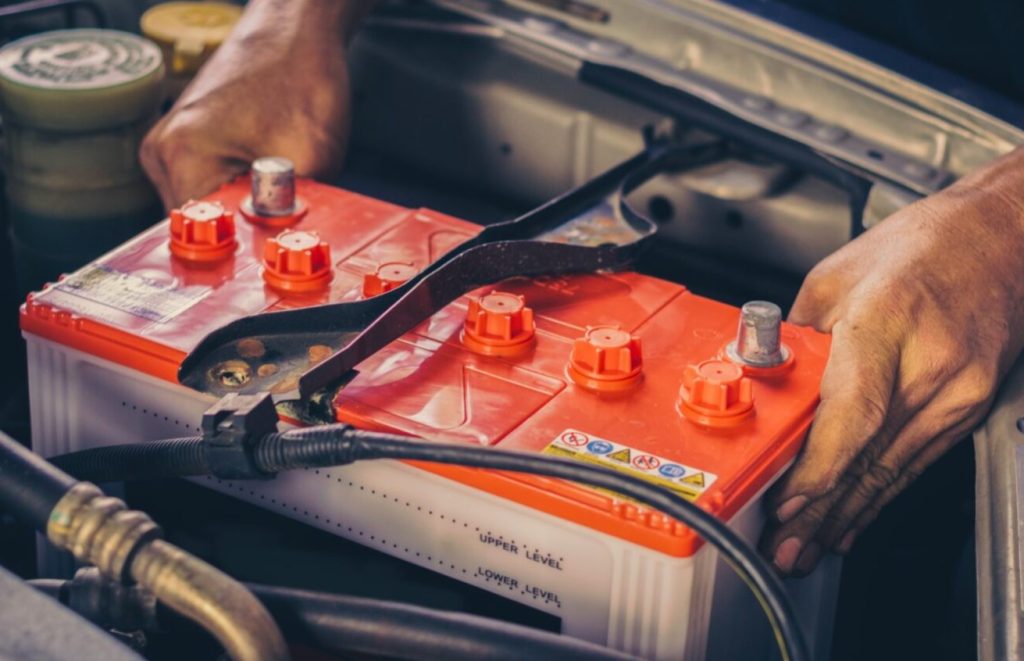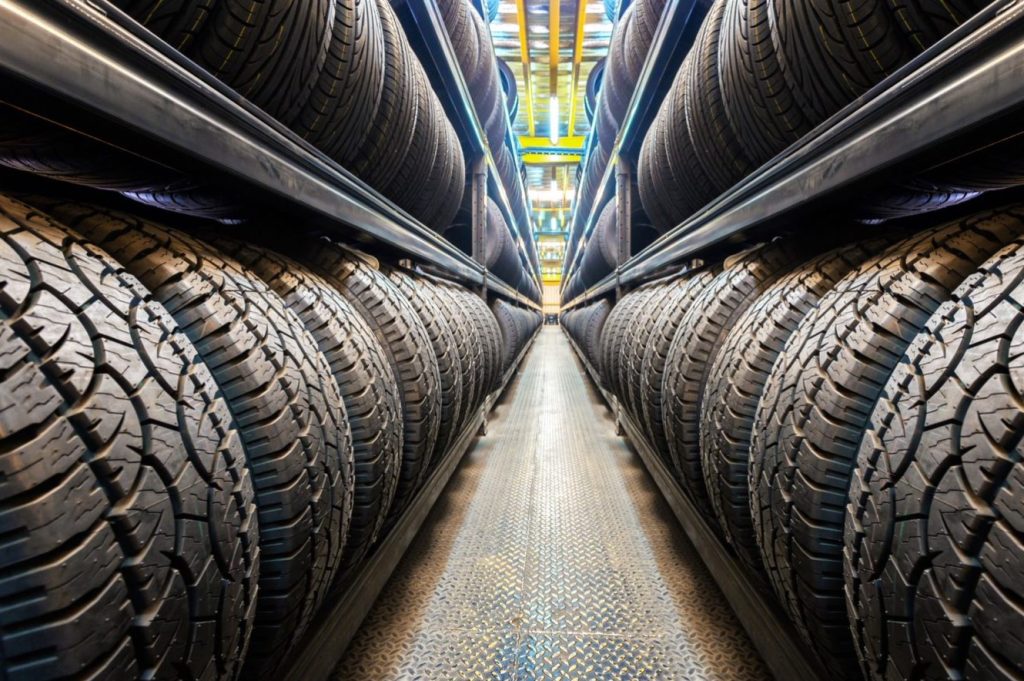Does Your Chevrolet Need a New Car Battery?
One of the first signs that your car battery could be on the decline is a sluggish engine crank. When you turn the key, and your engine hesitates or takes longer to start, it’s an indication that your battery might not be providing the necessary power. A robust battery should power the engine with a swift and energetic crank.

Dimming Headlights and Electrical Issues
Have you noticed your headlights dimming when you start your Chevrolet or while driving? Dimming lights can be a clear sign that your battery is struggling to maintain the required voltage. In addition to dimming headlights, you might also experience issues with your electrical components, such as power windows, the radio, or air conditioning. These electrical hiccups often point to battery trouble.
Read the rest of this entry »Car Financing Tips for First-Time Car Buyers
When it comes to financing a car for the first time, there are a few key points to consider. This post will provide an overview of the most important things to think about before making a final decision.

Purchasing your first car is an exciting milestone, but it often comes with the challenge of understanding car financing. Navigating the world of auto loans, interest rates, and payment terms can be overwhelming for first-time car buyers. In this comprehensive guide, we will share essential car financing tips to help you make informed decisions and secure the best deal when buying your first car.
1. Know Your Budget
Before you start shopping for a car, it’s crucial to establish a budget. Determine how much you can comfortably afford each month for your car payment, taking into account other expenses like insurance, fuel, maintenance, and registration fees. Be realistic about your financial situation to avoid overextending yourself.
Read the rest of this entry »If you’re in the market for a heavy-duty truck that can handle your toughest jobs with ease, the 2023 Chevrolet Silverado 3500 should be at the top of your list. This truck is built to deliver outstanding power, performance, and durability, making it the ideal choice for both work and play. In this blog, we’ll take a closer look at what makes the 2023 Chevrolet Silverado 3500 stand out from the crowd.

Unmatched Power
The heart of the 2023 Silverado 3500 lies under the hood. It offers two robust engine options, starting with the standard 6.6-liter V8 engine. This engine produces a remarkable 401 horsepower and 464 lb-ft of torque, ensuring that you have the power you need to conquer challenging terrain and heavy payloads.
For those who demand even more power, there’s the available Duramax® 6.6-liter Turbo-Diesel V8 engine. This beast generates a jaw-dropping 445 horsepower and a staggering 910 lb-ft of torque. With this engine, you’ll have the capability to tow heavy trailers and haul massive loads without breaking a sweat.
Read the rest of this entry »Drive on Over: 3 Great Fishing Spots Near Ottawa, OH
Fishing is a great way to decompress after a stressful week, enjoy the fresh air, and bond with your family. Fortunately, there are a lot of great places to fish from within driving distance of Ottawa, OH. Today, we are looking at the top three fishing spots that are worth the drive from Ottawa.

1. Mary Jane Thurston State Park
If you’re not sure where to fish, we recommend the Maumee River. You can access this river at Mary Jane Thurston State Park at 1466 State Route 65. Some of the most sought-after fish in this river include largemouth bass, smallmouth bass, and white bass. There are other fish species you can find in this river, too, including:
- Flathead catfish
- Channel catfish
- Walleye
- Bullhead
- Crappie
The Maumee River is also ideal for boating. There is a launch ramp near the park office, and you can launch a kayak, sailboat, or motorboat. If you don’t have your own watercraft, you can rent one seasonally.
Read the rest of this entry »Unearth the numerous benefits of regular engine maintenance. Enhance your vehicle’s performance and longevity with timely check-ups and proactive care.

Key Takeaways
- Regular engine maintenance improves fuel efficiency and vehicle performance.
- Timely upkeep prevents significant issues and costly repairs down the line.
- Care extends the lifespan of your vehicle, enhancing its resale value.
- It aids in providing a smoother and safer driving experience.
- Regular check-ups ensure compliance with emission standards, contributing to environmental sustainability.
Much like the human body, a car engine needs regular check-ups and maintenance to function optimally. Not unlike a heartbeat, the engine serves as the heart of your vehicle, driving it forward and ensuring its reliability.
If left neglected, the engine’s performance can decline and lead to costly repairs. This is where regular engine maintenance comes into play.
At Chevrolet of Ottawa, we provide comprehensive engine maintenance services tailored to your vehicle’s needs. Experience peace of mind and enhanced performance with our expert care.
The Importance of Engine Maintenance
Regular engine maintenance is a critical aspect of vehicle ownership that often gets overlooked. The complexity of modern engines demands periodic care to keep them running at their best.
Regular maintenance not only ensures the smooth functioning of the engine but also contributes to the overall performance of your vehicle.
Maintaining your engine properly can improve fuel efficiency, reducing your vehicle’s running costs. Clean filters and well-lubricated parts allow for better combustion, maximizing your mileage.
By ensuring your engine operates efficiently, you’re saving money and contributing to environmental sustainability by lowering your carbon footprint.
Preventing Major Issues
Timely engine maintenance can prevent major mechanical issues that may necessitate costly repairs. Regular check-ups can help identify potential problems early, such as oil leaks or worn-out parts, before they escalate into significant engine damage.
Through maintenance like oil changes, air filter replacements, and spark plug checks, you can keep your engine in top-notch condition, extending its lifespan.
The saying “prevention is better than cure” rings particularly true in engine maintenance.
An engine in good condition is less likely to break down and leave you stranded on the road, providing a smoother and safer driving experience.
Maintaining Vehicle Value
Just as regular home maintenance preserves and even increases a property’s value, the same is true for your vehicle. A well-maintained engine signifies a well-kept car, which can be a central selling point if you decide to sell your vehicle in the future.
Potential buyers often prioritize vehicles with a clean bill of health, and regular engine maintenance is a testament to this.
Additionally, a car that runs smoothly and efficiently is more likely to pass emission tests, increasing its resale value.
Emphasizing Safety
Regular engine maintenance isn’t only about preventing breakdowns or maintaining efficiency – it’s also a safety issue. An engine in good condition contributes to safer driving.
For instance, well-tuned engines respond better to control inputs, providing safer overtaking and emergency maneuvers.
Furthermore, timely maintenance checks can spot issues such as brake problems or tire issues, preventing accidents and ensuring a safe journey every time you hit the road.
Promoting Environmental Sustainability
Believe it or not, regular engine maintenance can help promote environmental sustainability. An efficient, well-maintained engine produces lower emissions, creating a cleaner environment.
Regular upkeep ensures that the engine’s combustion process operates efficiently, with the right balance of air and fuel. This results in fewer unburned fuel byproducts escaping through the exhaust.
Additionally, well-maintained engines support emission control systems like catalytic converters and oxygen sensors, which help convert harmful emissions into less harmful forms.
Proper maintenance also prevents engine wear and maintains correct ignition timing, promoting complete combustion and minimizing emissions of pollutants like nitrogen oxides and carbon monoxide.
Reducing the Risk of Overheating
One of the main reasons engines fail is overheating, often resulting from poor maintenance. The engine can’t effectively dissipate heat when your vehicle’s cooling system isn’t working correctly.
This can lead to problems, including warped parts, blown head gaskets, and, ultimately, a complete engine failure.
Regular engine maintenance, including inspecting and replacing coolant and thermostat, can significantly reduce the risk of overheating and keep your engine operating at an optimal temperature.
Increasing Driving Comfort
A well-maintained engine leads to a smoother, quieter ride. Loose or worn-out parts can create disturbing noises and vibrations that disrupt your driving experience.
Addressing these issues early during regular engine maintenance ensures that your vehicle remains as comfortable and pleasant to drive as the day you bought it.
Plus, an efficient engine contributes to better overall vehicle performance, leading to a more enjoyable driving experience.
Maintaining Warranty Compliance
Many vehicle warranties come with a clause requiring regular maintenance to remain valid. If an issue arises and you haven’t followed the recommended maintenance schedule, the manufacturer may deny your warranty claim.
Regular engine maintenance keeps your vehicle running smoothly and ensures you’re up-to-date with your manufacturer’s guidelines. This ensures your warranty remains valid, providing additional financial protection against unforeseen mechanical failures.
Reducing Stress and Worry
We’ve all felt that pang of worry when an unexpected light appears on our vehicle’s dashboard. Regular engine maintenance helps to reduce this stress by ensuring potential issues are caught and corrected early.
Peace of mind comes with knowing your vehicle is in good condition, which can make your driving experience more enjoyable. Regular engine check-ups translate into fewer surprises, fewer breakdowns, and fewer unexpected repair bills.
Supporting Your Local Economy
You also support your local economy by taking your vehicle in for regular engine maintenance. Local auto repair shops and dealerships rely on the business brought in by regular maintenance.
These local businesses often provide personalized service and build relationships with their customers, giving you a more satisfying experience than you might find at larger, impersonal chains.
Conclusion
Regular engine maintenance brings a plethora of benefits. It’s not just about keeping your vehicle running – improving performance, promoting safety, preserving value, and contributing to a greener planet.
So the next time you ponder the importance of engine maintenance, remember these benefits and their significant impact on your vehicle, your safety, and the environment.
Keep your engine purring and your car performing at its best with our expert services at Chevrolet of Ottawa. Schedule your engine maintenance appointment today and experience the benefits firsthand.
Explore the benefits of buying a certified pre-owned car, such as quality, warranty coverage, and satisfaction. Learn how these cars offer great value.

Key Takeaways
- Certified pre-owned cars come with multi-point inspection and refurbishment, all of which are thoroughly inspected and test driven beforehand.
- Warranties often accompany certified pre-owned vehicles, and are often extended.
- Certified pre-owned cars provide buyers with peace of mind and value for money.
- Purchasing from an accredited dealership ensures transparency and reliability.
Many people grapple with whether to purchase a new or a used vehicle when it comes to car shopping. While new cars have the latest features and zero mileage, used cars can provide more affordable options.
But there’s a third choice that combines the best of both worlds: a certified pre-owned car. These vehicles offer the affordability of a used car with the assurance and quality of a new one.
So, why should you consider a certified pre-owned car for your next vehicle purchase? Dive in to learn about the advantages they can offer you, and remember, at Chevrolet of Ottawa; we are always ready to assist you with your car-buying needs.
Quality Assurance
Guaranteed quality is one of the most significant benefits of buying a certified pre-owned car. Before a used vehicle can earn the title of ‘certified,’ it must undergo a comprehensive inspection process.
This examination typically includes a multi-point check of systems and components, from engine and transmission to brakes and interior features.
CPO vehicles are typically newer, low-mileage cars that have been handpicked by dealerships for their programs. These cars go through a comprehensive multi-point inspection that covers around 100 to 200 different aspects.
Skilled technicians thoroughly assess the mechanical components, exterior condition, interior quality, electrical systems, safety features, and more. A road test ensures the car’s performance meets standards, and any identified issues are rectified to align with manufacturer-approved CPO criteria. These vehicles come with a vehicle history report, manufacturer-backed warranty, and often include additional benefits like roadside assistance and special financing rates.
A vehicle that fails any part of this rigorous inspection won’t become certified pre-owned until the issue is addressed and fixed. As a result, you get a car that’s as close to new as a used car can be.
Warranty Coverage
The concept of warranty coverage for used vehicles may sound far-fetched, but it’s a reality with certified pre-owned cars. Buying a certified pre-owned vehicle usually comes with an extended warranty that covers various car parts for a specific period of miles.
Some warranties even provide additional benefits like roadside assistance, further securing your investment. This extended warranty coverage means that even if your vehicle encounters issues down the line, you won’t be left stranded with a hefty repair bill.
Peace of Mind
One of the main concerns when buying a used vehicle is the uncertainty. You might worry about the car’s history, previous accidents, and potential hidden issues.
However, when you buy a certified pre-owned car, the peace of mind you receive is unparalleled. Certified pre-owned cars come with a detailed history report outlining the vehicle’s past, including ownership history, accident history, and service records.
This transparency allows you to purchase a used car with the same confidence as if it were a new one.
Value for Money
Lastly, certified pre-owned cars provide significant value for your money. While they are more expensive than regular used cars, the added cost comes with quality assurance, warranty protection, and peace of mind.
In the long run, these benefits can save you considerable sums on unexpected repair and maintenance costs, making the certified pre-owned vehicle a cost-effective choice.
Purchasing from a Certified Dealership
In addition to the advantages already mentioned, buying a certified pre-owned car from a recognized dealership offers its own benefits.
Certified dealerships are typically associated with specific car manufacturers, meaning they possess expert knowledge about the vehicles they sell.
Not only does this give you a professional resource for all your questions, but it also ensures a high standard of service and maintenance for the cars.
The relationship with a certified dealership doesn’t end once the car leaves the lot. Many offer ongoing services, such as routine maintenance and repairs, which can further extend the lifespan of your certified pre-owned vehicle.
You can have peace of mind knowing that your vehicle is in the hands of those who know it best.
Reducing Environmental Impact
Buying a certified pre-owned car is not only beneficial for your wallet but also for the environment. By purchasing a pre-owned vehicle, you’re extending the life of that car and reducing the demand for new car production.
This can help decrease the overall carbon footprint associated with vehicle manufacturing. Not only are you making a wise financial decision, but you’re also making a conscious choice for sustainability.
Certified Pre-Owned Vs. Regular Used Cars
You might wonder why you should choose a certified pre-owned car instead of a used one. While used vehicles can often be bought at a lower price, they can come with uncertainties, such as hidden damages or mechanical issues, which could cost you more in the long run.
On the other hand, a certified pre-owned car is thoroughly inspected, refurbished, and certified by a professional to ensure it meets specific manufacturer standards.
This process offers additional protection and reduces the chances of facing unexpected issues after purchase.
The Certified Pre-Owned Car
A certified pre-owned car is a smart choice for those who want a vehicle that combines the benefits of new and used cars.
You get a car in excellent condition, has been thoroughly inspected and refurbished, comes with warranty coverage, and often includes added benefits such as roadside assistance.
Plus, you also have the reassurance of the car’s complete history report, reducing the uncertainties typically associated with used car purchases.
Considering all these factors, a certified pre-owned car provides excellent value for the price, making it an intelligent investment for many car shoppers.
Conclusion
There are numerous advantages to purchasing a certified pre-owned car, from assured quality and warranty coverage to environmental considerations.
When you invest in a certified pre-owned car, you’re investing in peace of mind, knowing you have a reliable, well-inspected, and covered vehicle.
At Chevrolet of Ottawa, we are dedicated to assisting you in making the best decision for your needs. Visit our dealership today to browse our impressive selection of certified pre-owned vehicles and take the first step toward finding your perfect car.
Understand the ins and outs of car depreciation. Learn how it affects your vehicle’s value, influencing factors, and tips to minimize the depreciation hit.

Key Takeaways
- Understand what car depreciation means and how it influences your vehicle’s value.
- Discover the factors that contribute to car depreciation.
- Learn about the different stages of car depreciation.
- Acquire strategies to minimize depreciation on your vehicle.
- Find out how understanding car depreciation can be beneficial when buying or selling a vehicle.
Behind the wheel and beneath the hood, there’s a hidden story every car carries – the story of depreciation. Car ownership comes with many considerations, one of which includes the future of your vehicle. When the time comes to sell your car, why not get the best deal by beating depreciation?
That’s why It is essential to understand what car depreciation means and how it can impact the value of your vehicle over time, and we’ll be breaking it down for you in this article. Before you embark on your car-buying journey, equip yourself with the knowledge to make informed decisions.
If you have any further queries about car depreciation rates, feel free to reach out to the professionals at Chevrolet of Ottawa. Our expert team is ready to assist you with any questions you may have.
What is Car Depreciation?
Car depreciation is the difference between the amount you spend when buying a car and the amount you recoup when you sell it. In simple terms, it’s the rate at which a vehicle loses its value over time.
A new car can lose anywhere from 20% to 30% of its value in the first year. By the end of the fifth year, it may have lost up to 60% of its initial value.
Factors Affecting Car Depreciation
A multitude of factors can affect how quickly a vehicle depreciates, including:
- Brand reputation and demand: Cars from reputable brands with a strong demand often depreciate slower than less popular or lower-quality brands.
- Mileage: The more miles a car drives, the lower its resale value. On average, a vehicle will depreciate faster once it hits a particular mileage threshold.
- Vehicle condition: Wear and tear, both interior and exterior, can significantly reduce a car’s value. Regular maintenance can help slow this process.
- Economic factors: Market trends and economic conditions can influence car depreciation. For example, fuel-efficient cars may depreciate slower when fuel prices are high.
How to Minimize Car Depreciation
While depreciation is inevitable, there are measures you can take to minimize its impact:
- Buy Used: As most depreciation occurs in the first few years, buying a used car can save you from the most significant hit.
- Maintain Your Vehicle: Regular maintenance and keeping all records can help retain your vehicle’s value.
- Limit Mileage: High mileage is a crucial factor in depreciation. Try to limit your miles to keep the car’s value high.
Understanding car depreciation can be a significant advantage whether you’re looking to buy a new vehicle or sell your current one. With the proper knowledge and strategy, you can maximize the value of your car investment.
Different Stages of Car Depreciation
Car depreciation isn’t a linear process. It happens in stages, with the most significant drop occurring in the first few years of ownership.
- Year One: In the first year, a new car can lose approximately 20%-30% of its value. This is due to the transition from an unknown to a used vehicle, which can significantly affect its market price.
- Years Two to Six: The depreciation rate will slow down over the next five years. On average, cars lose around 15% to 20% of their value annually during this period.
- Years Six and Beyond: The depreciation rate tends to stabilize after the sixth year. The vehicle’s value will continue to drop but at a slower and more predictable rate.
The Impact of Car Depreciation on Car Insurance
Car depreciation doesn’t just affect your vehicle’s resale value but also your car insurance. Most standard insurance policies cover the current market value of your car, different from what you paid for it. Therefore, if your vehicle has depreciated significantly, you could receive less compensation in the event of a total loss claim.
Car Depreciation and Leasing
Leasing a car offers an alternative to buying but doesn’t necessarily avoid depreciation. When you lease a vehicle, you’re paying for the car’s depreciation during the lease period.
The leasing company will determine the car’s residual value (its expected value at the end of the lease), and your payments will cover the difference between the current and residual values.
Understanding the Depreciation of Electric and Hybrid Cars
With the growing trend towards green technology, electric and hybrid cars are gaining significant popularity. However, it’s essential to understand how these cars depreciate before purchasing.
Traditionally, electric vehicles (EVs) and hybrids have suffered from rapid depreciation due to the rapid advancements in technology, the limited lifespan of batteries, and consumer apprehension towards new tech.
But as battery technology improves and electric and hybrid cars become more mainstream, their depreciation rates are starting to mirror those of conventional vehicles.
Luxury Cars and Depreciation
Luxury cars are often associated with a steep price tag, which unfortunately translates into higher depreciation.
High-end vehicles often come loaded with the latest technology and features, but these can become outdated quickly as new models are introduced.
The market for used luxury vehicles is also narrower than for more affordable cars, contributing to their quicker depreciation. However, some luxury brands hold their value better than others, so it pays to research.
The Role of Warranty in Car Depreciation
Car warranties play a crucial role in car depreciation. Vehicles with more extended warranty periods tend to depreciate at a slower rate as they offer buyers peace of mind.
A transferable warranty can be a selling point for used cars, as it assures the buyer that the manufacturer will cover certain costs if things go wrong. However, once a vehicle’s warranty expires, it often experiences a sharper depreciation.
Hence, purchasing an extended warranty could be a wise decision to protect your vehicle’s value.
Conclusion
Understanding car depreciation is crucial for every car owner or potential buyer. It lets you make more informed decisions about buying, selling, and maintaining your vehicle.
Remember, the slower your car depreciates, the more value you retain. So, choose wisely, maintain regularly, and keep a lid on those miles.
Interested in finding a car that combines value, performance, and style? Visit Chevrolet of Ottawa today to explore a range of vehicles designed to deliver value for money even as they age.
Ohio is home to some of the best golf courses in the world, and many of them can be easily reached when driving from Ottawa, OH. From high-profile course designers to luxury amenities, northwest Ohio courses have a lot to offer.

1. Muirfield Village Golf Club
The 18-hole course at Muirfield Village Golf Club was designed by Jack Nicklaus and is known for its well-tended fairways and terrific views. The amenities at this course include a putting green, a driving range, and a pitching and chipping area. Located at 5750 Memorial Drive in Dublin, Muirfield Village is about an hour and 45 minute drive from Ottawa.
Read the rest of this entry »Prompt recognition of worn-out tires not only ensures a smooth and safe drive, but it can also positively impact fuel efficiency and the lifespan of your Chevrolet. If you’re noticing any of the signs listed below, it’s probably time to visit your Chevrolet dealer and see about some new tires.

Tire Tread Wear
One of the most visible signs that your Chevrolet might need tires is the condition of the tire tread. Tire treads are designed to provide traction and channel water from beneath the tire to improve wet grip. But over time, the tread wears down. If the tread depth on any of your tires falls below 1/16th of an inch (or 1.6 millimeters), it’s time for a replacement.
Read the rest of this entry »Enhance the lifespan and aesthetics of your car’s interior! Discover tips on how to clean and maintain your car’s interior in this comprehensive guide.
Key Takeaways
- Regular cleaning is vital to get rid of stains, odors and maintain your vehicle’s longevity and aesthetic appeal.
- Different materials, such as leather and fabric, require different methods of cleaning.
- Cleaning isn’t a one time task – maintaining cleanliness is essential and should be incorporated into a routine.
- Do’s and Don’ts for car interior maintenance.
- Benefits of a well-maintained car’s interior for comfort and resale value.
A car is more than just a means of transportation; it symbolizes your personality and lifestyle. Who doesn’t want their car to stand out from the crowd? Maintaining its cleanliness, especially the car’s interior, is crucial for aesthetic appeal and ensuring its longevity.
So, let’s understand how to effectively clean and keep your car’s interior in top-notch condition. Check out our extensive selection of vehicles at Chevrolet of Ottawa if you’re in the market for a new ride!
Importance of Regular Cleaning
A clean car’s interior does more than just look good; it creates a pleasant environment and helps identify potential issues early.
Food spills, dirt, dust, and grime can lead to unpleasant odors, staining, and even damage to the interior surfaces if not addressed promptly. Regular cleaning can prevent these issues, keeping your car looking and smelling fresh.
Cleaning Different Materials
One solution doesn’t work for every component of your car’s interior. Different materials require different cleaning methods, as highlighted below.
- Fabric seats and carpets: Use a high-quality fabric cleaner to remove stains and odors. Vacuum the seats and carpets first to remove loose dirt and debris.
- Leather seats and surfaces: Leather requires careful treatment. Use a dedicated leather cleaner and conditioner to remove dirt and keep the material soft and supple.
- Dashboard and plastic surfaces: A damp microfiber cloth works well for removing dust. For tougher stains, use an all-purpose cleaner suitable for plastic surfaces.
Maintaining Cleanliness
Once you have thoroughly cleaned the interior, maintaining that cleanliness is essential.
- Regular vacuuming: Vacuum the interior at least once a week to prevent the accumulation of dust and dirt.
- Immediate action on spills: Treat any spills immediately to prevent staining. A portable car vacuum or wet wipes in your car can be a real lifesaver in these situations.
- Regular airing out: Regularly open the windows or doors when parked in a safe location to allow fresh air in. It helps reduce odors and maintain a fresh interior.
Do’s and Don’ts for Car Interior Maintenance
Following some simple rules can enhance the effectiveness of your cleaning efforts and prolong the life of your car’s interior materials.
Do’s:
- Use the right tools: Microfiber cloths, soft-bristle brushes, and specific car interior cleaning products are necessary for effective cleaning.
- Do clean from top to bottom: Start cleaning from the top (like the dashboard) and move towards the bottom. This prevents the redistribution of dust and dirt.
- Do treat stains immediately: Prompt action can prevent a spill from becoming a permanent stain.
Don’ts:
- Don’t use harsh chemicals: Avoid using bleach or other harsh chemicals that could damage your car’s interior.
- Don’t forget hard-to-reach places: Areas like air vents, cup holders, door pockets, etc., often get overlooked but can harbor dust and grime.
- Don’t ignore unpleasant smells: Bad odors are often a sign of mold or other issues that must be addressed promptly.
Benefits of a Well-Maintained Car’s Interior
Maintaining a clean car’s interior isn’t just about aesthetics; it has multiple benefits.
- Comfort: A clean interior provides a more comfortable and enjoyable driving experience.
- Health: Regular cleaning reduces allergens, bacteria, and other harmful particles, promoting better health for you and your passengers.
- Preservation: It helps preserve the interior materials, extending the lifespan of your car’s interior.
- Resale value: A well-maintained interior can enhance your car’s resale value, as buyers are more likely to purchase a well maintained vehicle.
DIY vs. Professional Cleaning
Understanding when to clean your car’s interior yourself and when to seek professional help can save you time and money. DIY cleaning is a great way to ensure your car’s interior remains tidy for daily or weekly upkeep.
Tools like a handheld vacuum, cleaning wipes, and fabric sprays can keep the interior looking fresh between deep cleanings.
However, it’s beneficial to turn to professional detailing services for stubborn stains, complex issues such as mold or at least once a year for a deep clean. They have the equipment and expertise to meticulously clean and restore your car’s interior.
Importance of Organizers and Accessories
To maintain a clean car’s interior, organization is vital. Consider using car organizers and accessories to keep your belongings in place. Seatback organizers, for example, can hold kids’ toys, books, and snacks.
Cup holder inserts can keep your drinks secure and prevent spills. Floor mats are an excellent investment as they protect the carpets from dirt and are easy to clean.
Not only will these accessories help keep your car clean, but they’ll also make the interior more functional and organized.
Car Air Fresheners
After you’ve worked hard to clean your car’s interior, an air freshener can add a finishing touch, making it smell as good as it looks. Various options are available, from traditional hanging paper fresheners to vent clips and even luxury car perfumes.
Choose a scent you love, but remember – the goal of the air freshener should be to compliment your clean car, not mask foul odors.
Safety Measures While Cleaning
When maintaining a clean car’s interior, safety should not be overlooked. Wear gloves when handling cleaning products, especially those with harsh chemicals.
If you’re vacuuming or using a steam cleaner, ensure the car is in a well-ventilated area to prevent the buildup of fumes. When cleaning electronics, such as your stereo or controls, lightly dampen the cloth instead of spraying the cleaner directly to avoid causing electrical issues.
Always read and follow the instructions and safety warnings on any cleaning products you use.
Conclusion
A well-kept car interior is pleasing to the eyes and ensures a comfortable, healthy driving experience while boosting your vehicle’s resale value.
Remember, maintenance is more cost-effective than repair. Cleaning and maintaining your car’s interior might seem tedious, but the benefits are worth the effort.
Discover our latest models and exceptional services at Chevrolet of Ottawa and make your driving experience unforgettable!
*Image From Pixabay




